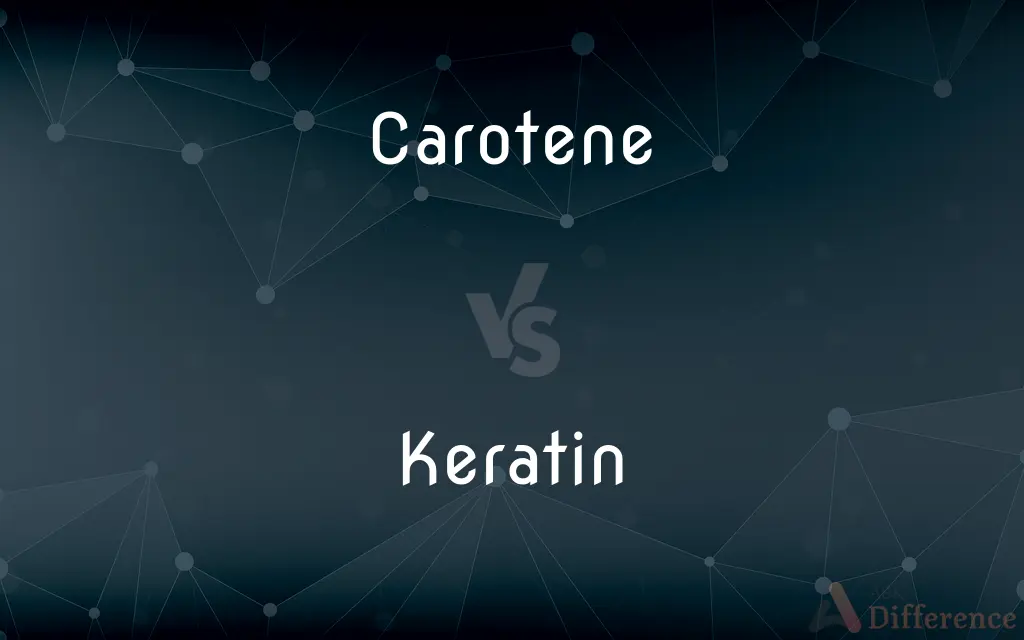Carotene vs. Keratin — What's the Difference?
By Fiza Rafique & Urooj Arif — Updated on April 1, 2024
Carotene is a pigment found in plants, contributing to their color, whereas keratin is a protein in humans and animals, vital for skin, hair, and nails.

Difference Between Carotene and Keratin
Table of Contents
ADVERTISEMENT
Key Differences
Carotene, a plant pigment, is essential for photosynthesis and gives fruits and vegetables their vibrant colors, such as carrots and sweet potatoes. On the other hand, keratin is a structural protein that forms the key structural material making up the outer layer of human skin, hair, and nails, providing strength and protection.
While carotene is a dietary component that can be converted into vitamin A in the body, playing a crucial role in vision, immune function, and skin health, keratin's role is predominantly structural, not directly impacting nutrition but essential for protecting and maintaining the health of epithelial cells against environmental damage.
Carotene's presence in the diet is associated with a reduced risk of certain diseases, including some forms of cancer and eye diseases, due to its antioxidant properties. Whereas keratin, through its structural roles, contributes to the physical barrier of the body against environmental damage, pathogens, and water loss.
The body cannot produce carotene; it must be obtained through diet, highlighting the importance of consuming carotene-rich fruits and vegetables. In contrast, the body synthesizes keratin from amino acids, indicating a need for a protein-rich diet to support keratin production.
Despite their different roles and origins, both carotene and keratin are essential for health. Carotene's antioxidant properties and role in vitamin A production contrast with keratin's structural support and protection for skin, hair, and nails.
ADVERTISEMENT
Comparison Chart
Nature
Plant pigment
Structural protein
Source
Fruits and vegetables
Human and animal bodies
Function
Antioxidant, vitamin A precursor
Structural component of skin, hair, nails
Health Impact
Supports vision, immune function, skin health
Protects and strengthens epithelial tissues
Dietary Requirement
Obtained through diet, cannot be synthesized by the human body
Synthesized in the body, requires a protein-rich diet
Compare with Definitions
Carotene
A pigment that gives plants and fruits their orange and yellow colors.
The orange color of carrots is due to their high carotene content.
Keratin
Provides structural strength and protection to epithelial cells.
The toughness of the outer layer of skin is due to keratin.
Carotene
An antioxidant that can be converted into vitamin A in the human body.
Consuming carotene-rich foods supports eye health and immunity.
Keratin
Involved in the healing process and cell regeneration.
Keratinocytes play a role in wound healing and skin renewal.
Carotene
Essential for photosynthesis in plants.
Carotene absorbs light energy for use in photosynthesis.
Keratin
A protein that makes up hair, skin, and nails in humans and animals.
Keratin treatments can make hair smoother and less frizzy.
Carotene
Cannot be synthesized by humans and must be ingested through diet.
A balanced diet including carotene-rich vegetables is important for adequate vitamin A intake.
Keratin
Synthesized in the body from amino acids.
Eating a diet high in protein can support healthy keratin production.
Carotene
Associated with reducing the risk of chronic diseases.
High dietary intake of carotene is linked to a lower risk of certain cancers.
Keratin
Key component in the physical barrier against environmental damage.
Keratin in the skin helps prevent water loss and protects against pathogens.
Carotene
The term carotene (also carotin, from the Latin carota, "carrot") is used for many related unsaturated hydrocarbon substances having the formula C40Hx, which are synthesized by plants but in general cannot be made by animals (with the exception of some aphids and spider mites which acquired the synthesizing genes from fungi). Carotenes are photosynthetic pigments important for photosynthesis.
Keratin
Keratin () is one of a family of fibrous structural proteins known as scleroproteins. α-Keratin is a type of keratin found in vertebrates.
Carotene
An orange or red plant pigment found in carrots and many other plant structures. It is a terpenoid hydrocarbon with several isomers, including beta-carotene.
Keratin
A fibrous protein forming the main structural constituent of hair, feathers, hoofs, claws, horns, etc.
Carotene
An orange-yellow to red crystalline pigment, C40H56, found in animal tissue and certain plants, such as carrots and squash. It exists in several isomeric forms and is converted to vitamin A in the liver.
Keratin
Any of a class of filamentous proteins that are abundant in the cytoskeleton of vertebrate epithelial cells and are the main constituents of the outer layer of skin and tough epidermal structures such as hair, nails, hooves, feathers, and claws.
Carotene
(organic chemistry) A class of tetraterpene plant pigments; they vary in colour from yellow, through orange to red, this colour originating in a chain of alternating single and double bonds.
Keratin
Material composed principally of keratin proteins.
Carotene
(organic chemistry) Specifically, a number of isomers of tetraterpene hydrocarbons, C40H56, (especially beta-carotene), present in carrots etc, which are converted into vitamin A in the liver.
Keratin
(protein) The protein of which hair and nails are composed.
Carotene
An orange isomer of an unsaturated hydrocarbon found in many plants; is converted into vitamin A in the liver
Keratin
A sulfur-containing fibrous protein constituting the main structural protein of hard epidermal tissues, such as horn, hair, feathers, nails, claws, hoofs, and the like. It is an insoluble substance, and, unlike elastin, is not dissolved even by gastric or pancreatic juice. By decomposition with sulphuric acid it yields leucine and tyrosine plus various other acid-stable amino acids. The amino acid composition varies, but it usually has a high percentage of cystine, which stabilizes and insolubilizes the protein by forming intrachain linkages. A softer form of keratin is present in the epidermis and whalebone. Called also epidermose.
Carotene
Yellow or orange-red fat-soluble pigments in plants
Keratin
A fibrous scleroprotein that occurs in the outer layer of the skin and in horny tissues such as hair feathers nails and hooves
Common Curiosities
What role does keratin play in the body?
Keratin provides structural strength to hair, skin, and nails, protecting against environmental damage and contributing to cell regeneration.
What is keratin?
Keratin is a structural protein found in humans and animals, making up hair, skin, and nails, providing strength and protection.
How does carotene benefit the body?
Carotene benefits the body by serving as an antioxidant and a precursor to vitamin A, essential for vision, immune function, and skin health.
How is keratin produced in the body?
Keratin is synthesized in the body from amino acids, requiring a diet rich in protein.
What is carotene?
Carotene is a plant pigment responsible for the orange and yellow colors of many fruits and vegetables, and it serves as a precursor to vitamin A in the human body.
Can the body produce carotene?
No, the body cannot produce carotene; it must be obtained through a diet rich in fruits and vegetables.
Can consuming carotene improve skin health?
Yes, consuming carotene can improve skin health due to its role in vitamin A production and antioxidant properties.
How can one increase their carotene intake?
Increasing intake of carotene-rich foods like carrots, sweet potatoes, and leafy greens can boost carotene intake.
Are carotene supplements as effective as dietary carotene?
While supplements can be beneficial, getting carotene from natural food sources is often recommended for its additional nutrients and fiber.
Does cooking affect the carotene content in foods?
Cooking can actually increase the availability of carotene from plant foods by breaking down cell walls.
Are there dietary sources of keratin?
While keratin itself is not consumed directly, eating a protein-rich diet supports the body's production of keratin.
Is keratin only important for hair?
No, keratin is also crucial for the health and strength of skin and nails, in addition to hair.
How does keratin protect the skin?
Keratin strengthens the skin's barrier, protecting against physical and environmental damage.
Can excessive carotene intake be harmful?
Excessive carotene intake, typically from supplements, can cause carotenemia, a condition where the skin turns orange, but it's not usually harmful.
Can keratin treatments damage hair?
While keratin treatments can smooth and strengthen hair, improper application or excessive use may cause damage.
Share Your Discovery

Previous Comparison
Colloquium vs. Seminar
Next Comparison
Cat vs. FelineAuthor Spotlight
Written by
Fiza RafiqueFiza Rafique is a skilled content writer at AskDifference.com, where she meticulously refines and enhances written pieces. Drawing from her vast editorial expertise, Fiza ensures clarity, accuracy, and precision in every article. Passionate about language, she continually seeks to elevate the quality of content for readers worldwide.
Co-written by
Urooj ArifUrooj is a skilled content writer at Ask Difference, known for her exceptional ability to simplify complex topics into engaging and informative content. With a passion for research and a flair for clear, concise writing, she consistently delivers articles that resonate with our diverse audience.














































